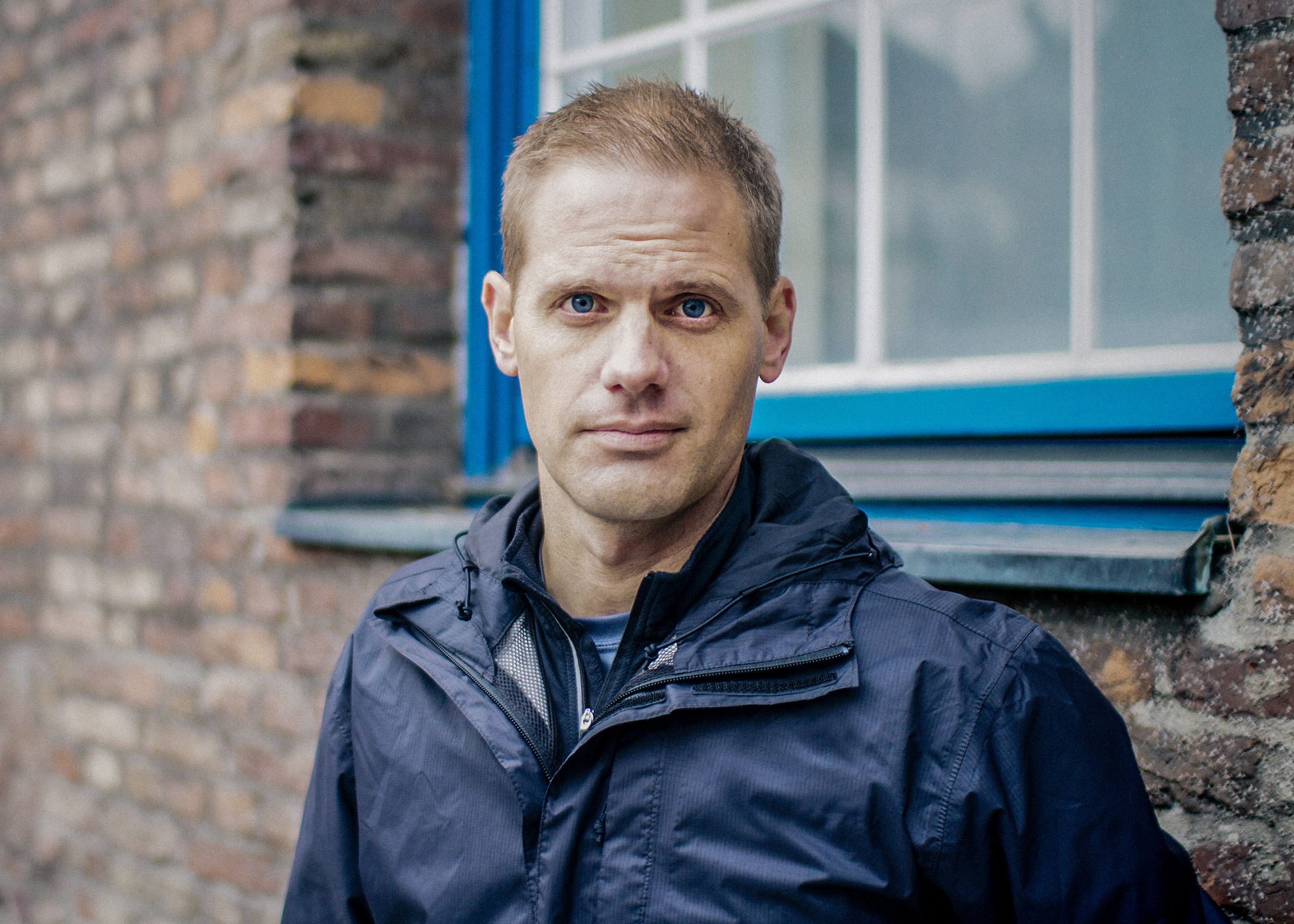
- Interview by Ryan & Tina Essmaker November 20, 2012
- Photo by Cameron Moll
Cameron Moll
- designer
- developer
Cameron Moll is a designer, speaker, and author who lives in Sarasota, Florida with his wife and four sons. He’s the founder of Authentic Jobs Inc, among other endeavors.
Interview
Describe your path to becoming a designer.
You could say I either did or did not take a traditional path to where I am today. I didn’t go to school for design. In fact, I’ve never taken any formal design classes. I used to be proud of that—I don’t know that I’m proud of that now. I think I would have enjoyed going through a structured program of some sort where I would have been able to participate in design reviews and get feedback from professors and peers.
I first went to school to be a music major and that didn’t work out, largely because one of my professors said to me one day during practice, “You know, Cameron, you might want to think about a different career. I don’t know if this music thing is going to work out.” I contemplated that advice at length and agreed with him; I think his assessment was correct. But that didn’t push me into design. Instead, I ended up getting a degree in business management. I had three kids by the time I graduated and business management was a very safe degree considering I had a family of five.
In 1999, while I was finishing up my degree, I was reading the school newspaper and a flier fell out. In it was an advertisement for web design jobs at a local dot-com. I had been interested in HTML and had experimented with it. I had built two horrific websites and somehow, they were enough to land me a full-time position. Granted, back then if you knew how to design two pixels, you were hired. I worked there while going to school full-time and over the next four and a half years, I climbed the ranks to become their creative director.
The biggest thing I learned from literally falling into design and making a career of it was that you can create with any medium and on any canvas. I grew up playing drums and doing a lot of woodworking. When it came time to fall into web design, it was the same process of formulating ideas and synthesizing elements together into a cohesive format. But now it was with pixels and colors versus wood, a lathe, and a saw or music, sticks, and toms. I found out that I loved it, so I kept doing it and thirteen years later, here I am.
How long did you work at your first job and when did you go out on your own?
After my job at the dot-com, I took a position as a marketing manager for about a year before making the leap to do my own thing. I freelanced for about two years and at that point, I interviewed with Apple and MSNBC and came very close to accepting positions with both of them. I ended up turning them down because it was still in the heyday of the housing market and moving to Seattle or Cupertino with a large family wasn’t feasible.
I kept doing my own thing and an opportunity came up to work as a principle interaction designer with the LDS Church in Salt Lake City, Utah. It was a very unique opportunity because they had about 35 full-time interaction designers on the team, which was unheard of at the time—this was around 2006. I had a lot of things on my resume, but I hadn’t worked at a very large corporation, and in this case, a nonprofit. I wanted to be pushed and challenged by being in an environment like that and having to deal with many individuals in many different departments. So I said yes and had a great experience there for the next three years.
After that, I left with the intention of making Authentic Jobs a full-time thing. I had started it the first time I was freelancing because I had a family to support and was the only one working. Timing client payments with fixed expenses and bills was very difficult and I knew I needed a way to smooth out that ebb and flow. I figured residual income would be a way to do that and that’s when I began Authentic Jobs, which I kept running on the side for the three years I worked at the LDS Church. Then, when it came time to go back to working for myself, Authentic Jobs was close enough to being something that could be full-time. It was a leap of faith to say, “Can I make this a full-time gig?” I made the leap and took on one client as a safety net and within two or three months, I no longer needed client work to support myself and my family financially. Authentic Jobs was growing and blossoming enough to sustain me and the other operations it now covers.
“When I put my heart into something, I go all out. That passion surfaces and expresses itself in the way that I dive into a subject.”
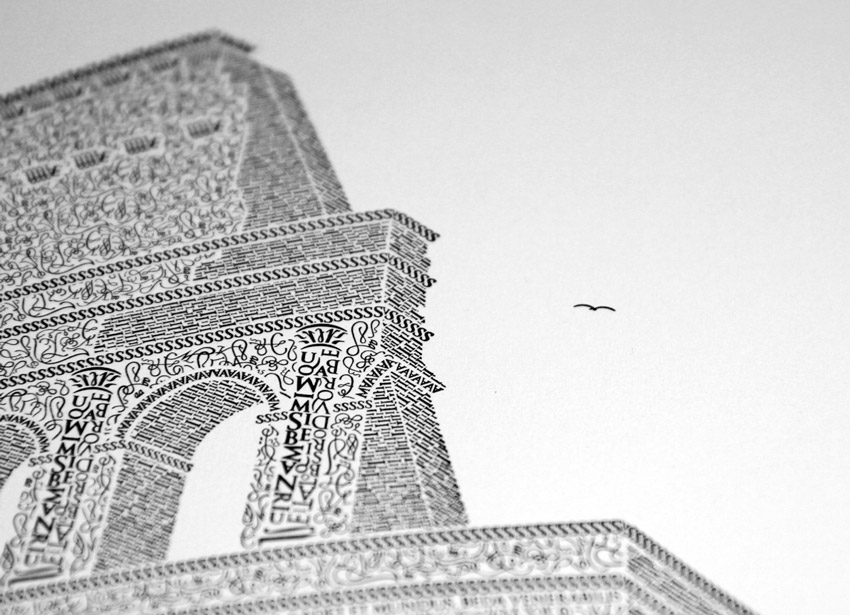
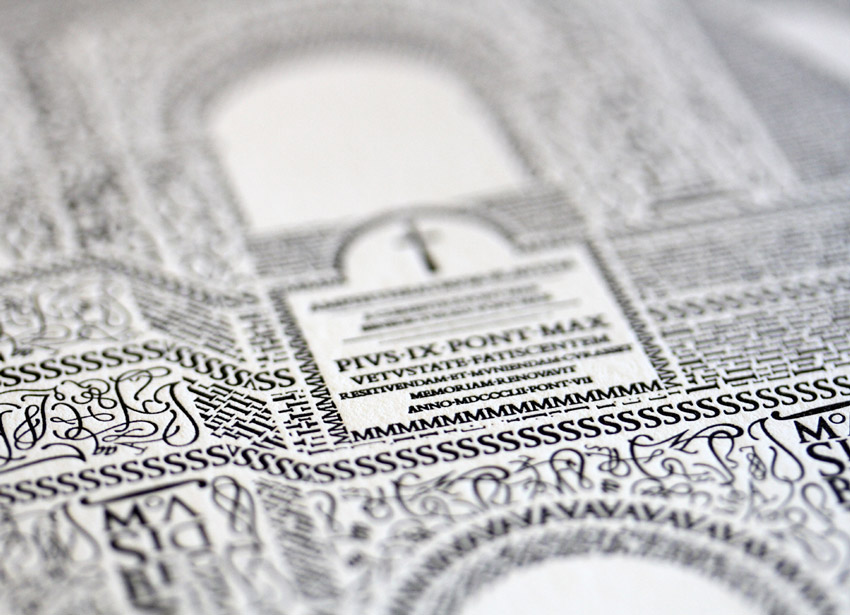
You said you studied music?
I did. I played drums growing up, mostly in high school and mostly jazz. I didn’t play in any garage bands or anything like that, although I wish I would have. I’ll tell you what; if you can play jazz, you can play just about any form of music. It’s so complex and takes so much creativity to improvise and play well with a group when you don’t know what they’re going to play next. If you can do that, you can play just about any kind of music. Maybe that’s why design was so easy for me—it was just synthesizing and composing, but with a different medium.
Where did you grow up and in addition to music, how else was creativity a part of your childhood?
That’s a great question. The growing up part is easy to answer. I grew up in Antioch, which is about 40 miles Northeast of San Francisco, California. It was a small town and my father worked in Palo Alto back in the heyday of Silicon Valley. I had wonderful experiences there and then I went off to college in Utah, got married, stayed there for about ten years, and moved down to Florida when I began Authentic Jobs as a full-time job.
Now, let me answer your question about creativity. I was always getting into trouble. I once tried to disassemble our dishwasher; I must have been five or six at the time. Being a father now, I know what it’s like to see your children do something mischievous, but also appreciating what they’re doing because they’re experimenting and trying to learn. That’s all I was doing; I wanted to know how this thing worked and, in my mind, the easiest way to do that was to take it apart. My mother was a saint in allowing me to do things like that.
I always take care of the stuff I own. I drive a 1988 Jeep Cherokee that has 253,000 miles on it; I’ve had that for 14 years and I plan to drive it until it has a million miles. I’ve repainted it and I do my best to treat it with the utmost care because I really appreciate the objects I surround myself with. I want them to be a reflection of this obsession I have for making things look great. I think part of me taking things apart when I was young was to understand how they worked, but also to try to improve them and make them better than they were.
Did you have any specific “aha” moments when you knew that design was what you wanted to do?
I value the assessment of my peers and place a great deal of confidence, trust, and appreciation in reviews I get from them. I had an “aha” moment a few months into my first job at that dot-com. When I started, I didn’t even know how to use Photoshop. I had been using FrontPage, which had a built-in image tool that allowed me to create some decent stuff. However, everyone at the company used Photoshop and now I had to rapidly learn it. I bought a book and studied in the evenings and on weekends. A few months into this, my manager came by my desk and looked over my shoulder at something I was working on. He didn’t say a whole lot about it, but the impression he gave was, “That’s pretty impressive for a guy who’s never done web design.” I could sense his reaction and that was a defining moment that I still vividly remember. I thought, “Maybe I have a shot at making this work.” In my mind, I had no idea that I was going to do web design full-time. This was just one of several turning points when I thought that maybe it was something I should keep doing once I finished school. And of course, it just continued from there.
Did you have any mentors along the way?
Yes, I had many—in the form of websites and books. At my first job, I worked with other web designers and it was great to be around them, but I had this voracious appetite for consuming any kind of information I could find. When I put my heart into something, I go all out. That passion surfaces and expresses itself in the way that I dive into a subject. I really dove into web design and ate up anything I could find. Webmonkey was big back then and I spent hours and hours on that site trying to understand HTML and user experience, which wasn’t even called that at the time. We often think of mentors as physical persons who we work or interact with, but in many ways, those virtual mentors are just as important. Sometimes dead mentors can also be just as important; the books we read from deceased masters can be just as valuable.
Was there a point in your life when you decided you had to take a big risk to move forward?
Before I answer that, let me say that I’ve built my entire career on pushing myself to do things that I didn’t believe I could do. I pushed myself to learn this thing called web design and HTML and then later, CSS. I pushed myself to try to design a building with letters and numbers, which led to my letterpress posters. For me, you could define my career by that alone—pushing myself to do things that I didn’t think I could do or that I thought I had no qualifications to do, yet I found a way to make them happen.
The two times that have been most risky for me are both times I leapt into freelance work because I had a family of five and then six to support. My wife Suzanne has not worked since we’ve had children and our oldest is now 12, so I’ve been supporting our family for the past 12 years. The first time I started freelancing was around 2005 and it was extremely scary because we were having our fourth son within a few months after that. There was no worse time to jump into freelancing than when I did, but there was also no better time because my name was gaining a lot of recognition in the industry and I was getting contacted weekly by individuals who wanted me to do a project for them. It made sense to try to transition from employment to self-employment while I had a lot of traction.
It was similar the second time. I decided to try to make Authentic Jobs a full-time job and as I mentioned earlier, I only took on one client as a safety net. I look back now and ask, “Was I just stupid or was I really brave in thinking I could make it work?” I think it was both. I think it requires a bit of stupidity and bravado to make these risky situations pan out in our favor, and sometimes they don’t. I’m extremely grateful for the risks I have taken and I don’t think I’d be where I’m at today had I not taken them.
It sounds like your family and friends are supportive of what you do?
Definitely. My wife has been an absolute angel all these years. She’s had to watch our sons late into the night and on weekends when I’ve had to work on projects. I don’t do that much anymore, but even so, if I look back over the last 14 years we’ve been married, it’s been a long road to get to where we’re at.
In that early phase of your career, you have to dedicate yourself to get to where you want to be. I don’t think I would be where I am today without having sacrificed quite a bit of time with my family. Now I’m at the point where I have sons playing soccer and I’m the coach of two of their teams. Family has always been important, but it’s now more important that I dedicate time to them and work more normal hours. So it’s been a transitional period over the last few years. I’ve went from working as hard as I could to intentionally scaling back and realizing it’s okay if I pass up a speaking opportunity or a book opportunity in order to spend more time with my sons and my wife. All things considered, my wife, sons, family, and friends have all been supportive.
Does your family understand what you do for a living?
Yes. They are very well-versed in what I do on a day-to-day basis. Suzanne is listed as a managing director for Authentic Jobs and she counsels with me quite a bit about the direction of the business.
My sons are very familiar with what I do. We homeschool all of our children and I take them for about three hours on Fridays. I teach them sports, music, Spanish, and web design. We have a room in our house dedicated as the schoolroom. For our last class, I used a projector to teach them to code a web page from start to finish in BBEdit. They each had a computer open and were typing in code as I was teaching them, so they know exactly what I do on a daily basis.
Do you feel a responsibility to contribute to something bigger than yourself?
Absolutely. Giving back is a very integral part of who I am and the business I conduct. That’s why we latched onto charitable giving for Authentic Jobs early on. The business has been around for seven years and in one way or another, we have been giving back for almost all seven years. In the early days, Authentic Jobs started out as a pro bono service. I was manually typing in entries in MovableType to post listings on behalf of companies who came to me with positions they were trying to fill. For me, that was a way to give some of my time to help these companies connect with talented individuals. Soon after that when I monetized the service, we started setting aside 1% of our income and investing that in loans on Kiva. That made sense for Authentic Jobs because we’re about connecting individuals with jobs and Kiva is about connecting entrepreneurs with funding. As of today, I think we’ve funded nearly 300 loans.
I wanted to go beyond monetary donations and at some point, I stumbled upon charity: water. Something clicked in my mind and it became apparent to me that there was no greater cause or more important way to give back than to give that very fundamental element of clean water. Even though it had no specific ties to Authentic Jobs, it had direct ties to our mission of giving back. We started rallying our customers and users to contribute to charity: water and since then, we’ve run several campaigns with them.
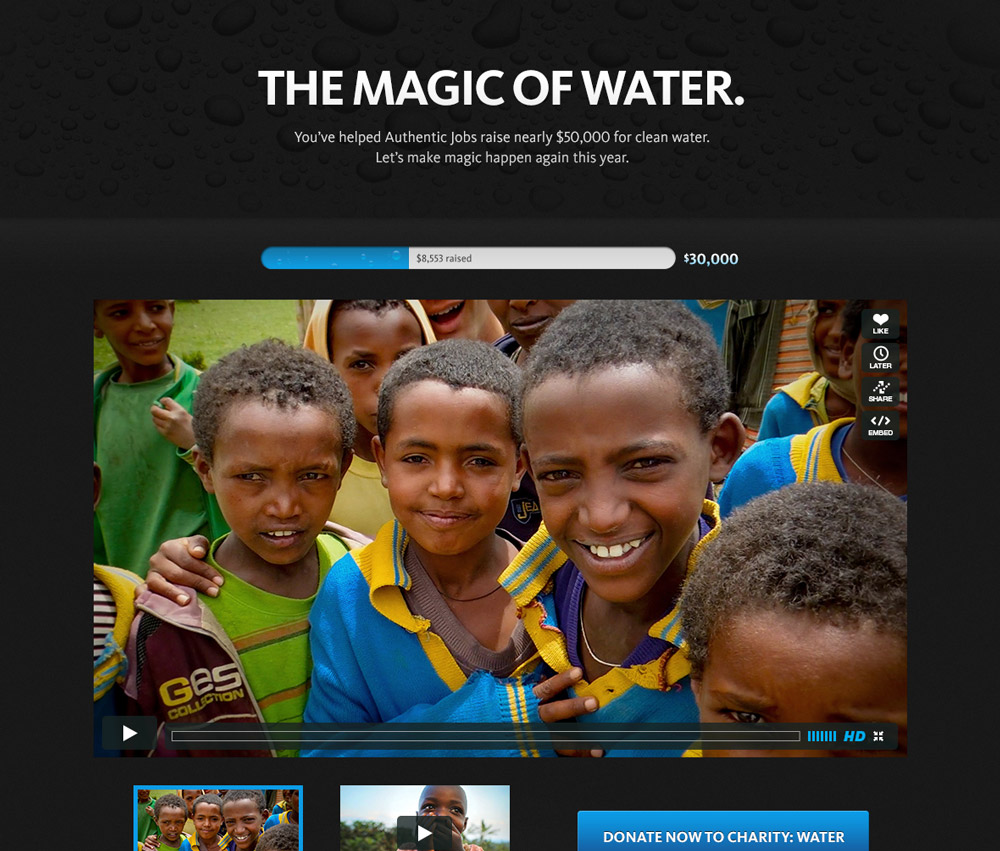
Are you satisfied creatively?
I don’t think I’ll ever be satisfied creatively. I worry about the day I’m satisfied creatively because at that point, I will either think I’ve arrived or I will have exhausted my ability to push myself to try new things. I don’t want to go down either one of those roads. I’d rather continue to question my ability to create things that are great, respected, and appreciated.
So the short answer to your question is no. I hope I am never satisfied creatively because at that point, the switches will have turned off either in my mind or worse, in my heart. I want to always be creating, always be composing, always be synthesizing ideas, and always be making sense of the world around me.
In that same vein, is there anything you want to try in the next 10 years that you’re not doing now?
Yes! I want to compose music for films—that’s what I originally went to school for, although I didn’t get very far. I listen to film soundtracks all the time. I grew up loving film and music and in my later teen years, I decided to put those two together and compose music for films. Part of the reason I failed as a music major is that I grew up exclusively playing drums. Drums are fantastic for understanding rhythm, but not for reading and writing music that goes up and down the scale. I couldn’t read music, so I don’t know what I was thinking expecting that I could compose music for an entire orchestra without being able to write it.
I still have this insatiable desire to compose music for films and I know I have it in me to do it. Not knowing how to write or read music is as trivial to me as not knowing how to read or write CSS. There was a learning curve associated with understanding and mastering CSS; I expect to encounter that same learning curve with learning how to read and write music. When I have the time to tackle that challenge, you can rest assured that I will. Maybe someday you’ll see my name at the end of a film in the credits. Who knows?
We hope we do! Alright, if you could give one piece of advice to another designer starting out, what would you say?
This is another great question. I’ve been asked this before and my answer is always, find something you’re passionate about and write about that passion. There’s no better way to articulate what’s in your head than to get it on paper. Write it in a way that makes sense for other people to digest, but also that inspires others to become greater at their craft or to want to learn more about the subject you’re writing about. Think about any form of creativity—if you can write well about it, it changes the way that you see the world and amazing things can happen.
That’s what happened to me. I had a passion for web design and I started writing about it. Within two years, I had a well-trafficked site, job offers from notable companies, and I eventually had offers to speak at conferences and write books. I trace all of that back to this passion I had for design and sticking to writing about it consistently. It worked out well for me because I fell into blogging in 2003 when it was gaining a lot of popularity. The timing was good for me, but I was also consistent and didn’t give up. A lot of people ask me, “How can I do the same thing you’ve done?” They’re expecting something overnight. If they write three or four blog posts and nothing happens, they give up. I tell people, “Look two years down the road. Have a passion, write about that passion for two years, and see where it goes.”
You’re in Florida now. How does where you live impact your creativity?
Now that’s a good question. (laughing) I honestly don’t know that it does. I think the impact is somewhat neutral because the positives and negatives cancel each other out. The positives are that we are living as a family precisely where we wanted to live. Because I work for myself and my business is online, we could live anywhere in the world as long as we have an Internet connection. We decided to move down here, at least for this period of our lives. Suzanne grew up here near the ocean and I grew up on the West Coast. We didn’t enjoy the winters in Utah. Now, we are now living about five miles from one of the most beautiful beaches in the nation.
The downside of that is that we literally live in a retirement community. It’s not uncommon for us to go out to dinner and have 70% of the people around us be gray-haired. There really is no web community here. The closest thing we have to a web community is in Tampa, which is an hour away, but I rarely get up there.
The beauty of the environment we live in now is that while I don’t have people in my geographic location to associate with, the Internet is a beautiful thing when it comes to connecting people in disparate locations. There are also conferences I attend, like Brooklyn Beta—what a wonderful example of being able to rub shoulders with people like yourselves. I don’t know that I need to live somewhere like San Francisco to satisfy myself creatively. Creativity comes from so many different sources, right? Physical contact with other creative individuals is only one source.
Now, having said all of that, I was just in San Francisco last week and there’s definitely something to be said for being in a space like Brooklyn or San Francisco where there is no shortage of inspiration surrounding you. But sometimes I think we overestimate location and place too much value in it.
“I am challenged to be better by other people who are more creative or talented than I am. If I can see those people executing what they do…it naturally pushes me to try harder…”
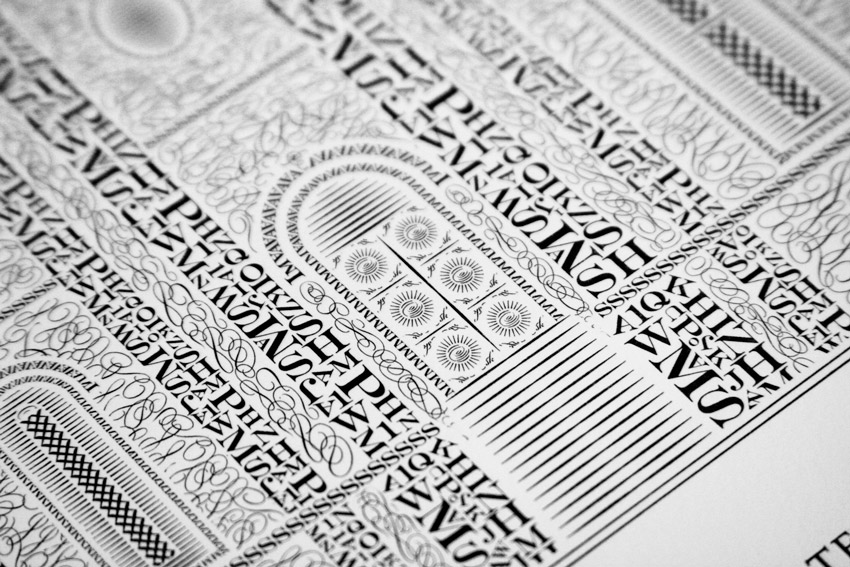

Is it important to you to be part of a creative community of people?
Yes. I think there are a lot of reasons why it’s important, but I’ll just give you one. I am challenged to be better by other people who are more creative or talented than I am. If I can see those people executing what they do and even rub shoulders with them, it naturally pushes me to try harder and try to perform at a higher level. I don’t necessarily try to mimic the work or standards of others, but I do appreciate being able to see the success they’ve attained and seeing if I can achieve that same kind of success.
Here’s the funny thing—apparently this is built into my DNA because my oldest son is extremely competitive. He is pushed to be better when he sees people who are more talented than him. For example, he performs best at soccer when he plays against players who are better than him because it pushes him to be better. In a creative sense, when I see other designers who are more talented than I am and create things that I am envious of, it naturally pushes me to try harder. That wouldn’t be possible without community of some sort.
What does a typical day look like for you?
Do you want to know everything?
(all laughing)
That’s entirely up to you.
I get up around 5:30am and do about 30 minutes of religious study. Then on alternating days, I either do weight training or cycle. My wife bought me a road bike a few months ago and I finally started cycling. After working out, I eat breakfast, shower, and get to my desk around 8:30am.
About 95% of what I do throughout the day is for Authentic Jobs. There are three of us. I do all the UI design; Adam Spooner does all the front-end development; and Myles Grant does most of the back-end development. Myles has been with me nearly since the start of Authentic Jobs. In addition to UI design, I have to run the business, which includes administration, strategy, customer support, and a lot more. Anything else I do, like the letterpress posters, is an after-hours thing.
I work until noon and take 30 to 60 minutes for lunch. I shut off around 4:45pm, pack up my things, have a quick dinner with the family, and then we’re off to soccer practice every night of the week except Friday. Then we go back home, get the kids ready for bed, and I might watch a little football. I go to bed around 11pm or midnight on most nights. Sometimes I’ll go back into the office to work on my letterpress posters. That’s it; that’s a typical workday.
What are you listening to right now?
I’m pretty old-school and am still a big fan of Pandora. I don’t know entirely why that is, but I think it’s that I enjoy the element of surprise that Pandora presents to me and I appreciate being able to discover music through it. I have a ton of stations set up—everything from soundtracks composed by James Horner and John Barry, to artists like Frank Sinatra and Mumford & Sons. I don’t know that there’s anything I listen to regularly. Well, I listen to a lot of jazz. I’m a big fan of Diana Krall, John Coltrane, and Miles Davis. I don’t have a particular genre or style that I stick to, but at the end of the day, I will almost always gravitate back to orchestral and jazz music.
Do you have any favorite movies or TV shows?
My favorite movie is Searching for Bobby Fischer. It’s done beautifully and the story is compelling. I was 22 when I first watched it and it struck a chord with me. I don’t latch onto TV shows for some reason. The only TV I watch regularly is college football.
Do you have a favorite book?
I don’t read as many books as I should. For me, reading was and still is a chore. I don’t enjoy it. The last book I read from cover to cover was The Great Bridge, which is an exhaustive book about the Brooklyn Bridge by David McCullough. I thought it was fascinating, but I still had to push myself to finish it—it took me almost nine months.
Favorite food?
Ooh! I lived in Mexico for two years and am a huge fan of not just any Mexican food, but authentic Mexican food. A lot of people don’t enjoy authentic Mexican because it’s nothing like the American Mexican food we have here. You go to Mexico and it’s really basic stuff. I love that.
What kind of legacy do you hope to leave?
Let me think about that. I think there are so many answers to that question. Let me see if I can answer it in a couple different ways.
I think the legacy I hope to leave for my family is that they, of all people, knew me in the most intimate way and regardless of how the public saw me, I hope they will be appreciative and thankful for who I was in their presence. Yes, I might have accomplished some things in my career and maybe there are some positive things that have been said about me, but none of that compares to what my family might think of me or say about me when I’m gone because they will have known the real Cameron.
As far as the legacy I want to leave to the public, I hope that when people think of Cameron Moll, there is an expectation to try harder. I don’t have it all figured out; I’ve made so many mistakes, but I hope that through some of the work I’ve produced or the efforts I’ve championed, people feel inspired to try harder and be better. I think of dead masters who I admire and look up to who pushed me to be better as a creative individual. I hope that I can leave that same legacy with others—that they feel pressured by this dead person, Cameron Moll, to try harder and be a little bit better.
“I don’t have it all figured out; I’ve made so many mistakes, but I hope that through some of the work I’ve produced or the efforts I’ve championed, people feel inspired to try harder and be better.”